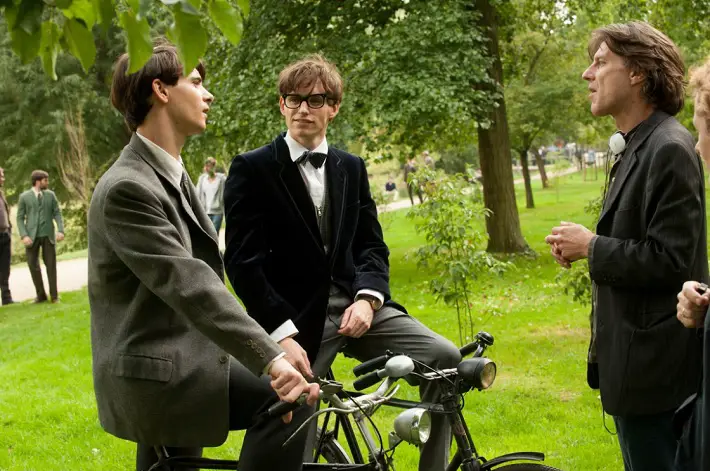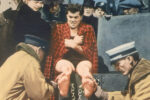The Theory of Everything (2014) – Film Review

Director: James Marsh
Cast: Eddie Redmayne, Felicity Jones, Simon McBurney
Certificate: 12
by Jen Grimble
This year, biopics of legendary icons dominate film-land. In the wake of Alan Turing, James Brown and JMW Turner, Stephen Hawking takes his turn, in The Theory of Everything. Director James Marsh, best known for Project Nim and Man on Wire, captures the extraordinary story of the British physicist, through a tale of love, belief and human endeavour.
Primarily the film focuses on the life-long relationship between Stephen (Eddie Redmayne) and his wife of 30-years, Jane (Felicity Jones). As an adaptation of Jane’s real-life memoir, the movie is reluctant to stray too far from their story. Yet it does so in small segments throughout, in the form of ‘the theory.’ During the film Hawking attempts to produce a formula that will explain the world and everything within it. Almost mathematically The Theory of Everything travels between the theme of romance to that of science.
We enter in 1963, where Stephen is studying Cosmology at the University of Cambridge. He meets Jane at a party, before escorting her to a Ball, where they get together. As the relationship develops, Stephen becomes increasingly unsteady on his feet. Soon, a dramatic fall lands him in hospital. Stephen is diagnosed with Motor Neurone Disease, a degenerative illness with a 2-year life expectancy. Despite this, the couple marry and Jane becomes both wife and carer. It is only after the birth of their first two children, and further deterioration to Stephen’s health, that Jane seeks comfort and assistance from recently widowed Choirmaster, Jonathan (Charlie Cox).
“Strength to draw you in and reduce you to tears”
In-between these scenes, the film explores Hawking’s journey from a socially awkward student, to the completion of his masterpiece, A Brief History of Time. In no way does the film ignore Hawking’s professional achievements,. Instead they are used as stopgaps for the rest of the story. What this creates, is a well-balanced and often gut-wrenching exploration of love. Marsh finds equilibrium between romance and science, somehow making both aspects equally interesting.
Marsh also makes clear comparisons with The Imitation Game. Two iconic 20th century geniuses battle emotional or physical strife, before succeeding beyond the realms of probability. Both films also have the strength to draw you in and reduce you to tears. Yet what sets The Theory of Everything apart is the performance of Eddie Redmayne. We are never allowed to forget that this is factual. Instead, his portrayal is so realistic, so captivating and respectful, that at times, we forget we are even watching a film. This is where The Theory of Everything transcends its counterparts and is allowed to truly excel.
The Theory of Everything leaves us emotional, pondering the very idea of life. Defying the odds, both personally and scientifically, the movie showcases Hawking’s incredible achievements, whilst not forgetting for a moment, the importance of Jane. Marsh explores the complexities of human life, yet never fails to engage and enthral, and like the subject of his film, triumphs against the odds.
9/10










